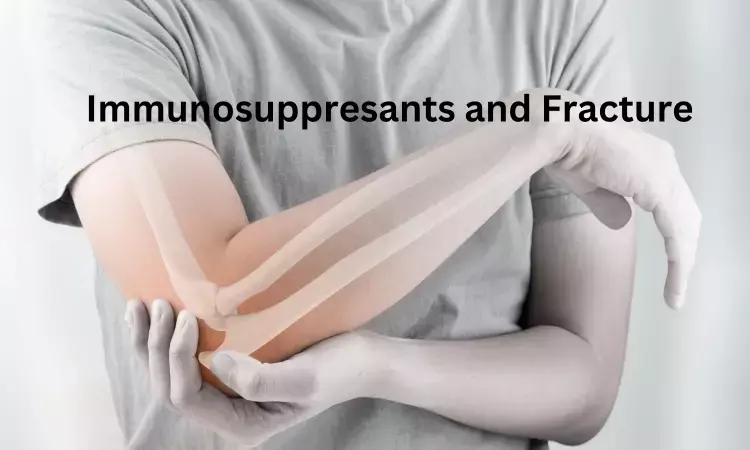- Home
- Medical news & Guidelines
- Anesthesiology
- Cardiology and CTVS
- Critical Care
- Dentistry
- Dermatology
- Diabetes and Endocrinology
- ENT
- Gastroenterology
- Medicine
- Nephrology
- Neurology
- Obstretics-Gynaecology
- Oncology
- Ophthalmology
- Orthopaedics
- Pediatrics-Neonatology
- Psychiatry
- Pulmonology
- Radiology
- Surgery
- Urology
- Laboratory Medicine
- Diet
- Nursing
- Paramedical
- Physiotherapy
- Health news
- Fact Check
- Bone Health Fact Check
- Brain Health Fact Check
- Cancer Related Fact Check
- Child Care Fact Check
- Dental and oral health fact check
- Diabetes and metabolic health fact check
- Diet and Nutrition Fact Check
- Eye and ENT Care Fact Check
- Fitness fact check
- Gut health fact check
- Heart health fact check
- Kidney health fact check
- Medical education fact check
- Men's health fact check
- Respiratory fact check
- Skin and hair care fact check
- Vaccine and Immunization fact check
- Women's health fact check
- AYUSH
- State News
- Andaman and Nicobar Islands
- Andhra Pradesh
- Arunachal Pradesh
- Assam
- Bihar
- Chandigarh
- Chattisgarh
- Dadra and Nagar Haveli
- Daman and Diu
- Delhi
- Goa
- Gujarat
- Haryana
- Himachal Pradesh
- Jammu & Kashmir
- Jharkhand
- Karnataka
- Kerala
- Ladakh
- Lakshadweep
- Madhya Pradesh
- Maharashtra
- Manipur
- Meghalaya
- Mizoram
- Nagaland
- Odisha
- Puducherry
- Punjab
- Rajasthan
- Sikkim
- Tamil Nadu
- Telangana
- Tripura
- Uttar Pradesh
- Uttrakhand
- West Bengal
- Medical Education
- Industry
Use of immunosuppressive agents may increased fracture risk among patients with autoimmune diseases

Several studies have investigated the association between immunosuppressive agents and fracture risk in patients with autoimmune diseases. The mechanisms underlying the association between immunosuppressive agents and fracture risk in autoimmune disease patients are complex and not fully understood.
However, it is thought that these medications may affect bone metabolism and increase the risk of osteoporosis, a condition characterized by low bone density and increased fracture risk. A new study in Biomedicines reports that the long-term use of immunosuppressive agents in patients with autoimmune diseases may increase the risk of fractures specifically the hip regions.
Researchers conducted a retrospective study using data from Taiwan’s National Health Insurance Research Database. Patients diagnosed with autoimmune diseases between 2000 and 2014, including psoriatic arthritis, rheumatoid arthritis, ankylosing spondylitis, and systemic lupus erythematosus, were included in the study. A control group of patients without autoimmune diseases was selected from the same database during the same period. Patients with autoimmune diseases were divided into two sub-cohorts based on their use of immunosuppressive agents.
The key findings of the study are
• This study found the risk of fractures was 1.14 times higher in patients with autoimmune diseases than in those without.
• Moreover, they found that patients in the immunosuppressant sub-cohort had a higher risk of fractures compared to those in the non-immunosuppressant sub-cohort.
• The adjusted sub-distribution hazard ratio for shoulder fractures was 1.27 (95% CI = 1.01–1.58), for spine fractures was 1.43 (95% CI = 1.26–1.62), for wrist fractures was 0.95 (95% CI = 0.75–1.22), and for hip fractures was 1.67 (95% CI = 1.38–2.03).
Researchers concluded that “The results of this study suggest that immunosuppressive use may increase the risk of fractures in patients with autoimmune diseases, particularly at the hip. Clinicians should be aware of this potential risk and take steps to minimize the risk of falls in these patients.” Further research is needed to elucidate the mechanisms underlying the association between immunosuppressant use and fracture risk in autoimmune diseases and to determine the optimal strategies for preventing fractures in these patients.
Reference: Kao F-C, Hsu Y-C, Tu Y-K, Chen T-S, Wang H-H, Lin J. Long-Term Use of Immunosuppressive Agents Increased the Risk of Fractures in Patients with Autoimmune Diseases: An 18-Year Population-Based Cohort Study. Biomedicines. 2023; 11(10):2764. https://doi.org/10.3390/biomedicines11102764.
MSc. Neuroscience
Niveditha Subramani a MSc. Neuroscience (Faculty of Medicine) graduate from University of Madras, Chennai. Ambitious in Neuro research having worked in motor diseases and neuron apoptosis is interested in more of new upcoming research and their advancement in field of medicine. She has an engrossed skill towards writing and her roles at Medical dialogue include Sr. Content writer. Her news covers new discoveries and updates in field of medicine. She can be reached at editorial@medicaldialogues.in
Dr Kamal Kant Kohli-MBBS, DTCD- a chest specialist with more than 30 years of practice and a flair for writing clinical articles, Dr Kamal Kant Kohli joined Medical Dialogues as a Chief Editor of Medical News. Besides writing articles, as an editor, he proofreads and verifies all the medical content published on Medical Dialogues including those coming from journals, studies,medical conferences,guidelines etc. Email: drkohli@medicaldialogues.in. Contact no. 011-43720751


